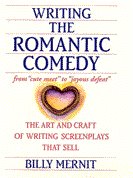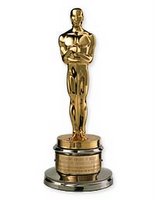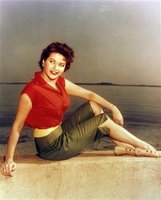

I was working on a synopsis last week and I found myself returning to one of my favorite books on writing for guidance. If you've not already checked out Billy Mernit's
Writing the Romantic Comedy, I highly recommend it. Although the title indicates its application to the romantic comedy (or "romcom" as Billy puts it) subgenre, a quick review of the book will illustrate that the points covered here are pertinent to all forms of the romance genre. I feel that the studies on character and his main points on plotting, or "Billy Beats" as my critique partner Karen and I have been known to call them, can easily apply to all forms of commercial fiction.
Mernit first stresses the importance of getting to know your characters, indicating that characters create their own stories, and provides some stellar to-the-point questions for attaining that end. He also provides some other helpful exercises throughout the book focusing on various aspects of the storytelling process.
Mernit has broken down the traditional three-act structure of story into seven beats. The man's done his research and cites many successful romantic comedies in his book. Here are the Billy Beats (and in parentheticals, my analysis of the Billy Beats applied to the film,
His Girl Friday):
1.
CHEMICAL EQUATION: SETUP - A scene or sequence that identifies the “what’s wrong with this picture” in a protagonist’s status quo; in romantic comedy, it implies that what’s missing in the protagonist’s life is likely to be fulfilled by a potential mate.
(Heroine is about to marry a man that has less personality than a formica countertop.)
2.
CUTE MEET: CATALYST - The Hero and Heroine cross paths for the first time, the inciting incident that brings man and woman together and into conflict; an inventive but credible contrivance, often amusing, which in some way sets the tone for the action to come.
(Heroine verbally spars, exchanging comic banter, with her ex-husband, a man who is obviously still interested in her.)
3.
A SEXY COMPLICATION: TURNING POINT - Traditionally occurring at the end of Act 1, a new development that raises story stakes and clearly defines the protagonist's goal; most successful when it sets man and woman at cross purposes and/or their inner emotions at odds with the goal.
(Heroine agrees to do one last reporting job for her ex-husband, which temporarily puts the hold on her upcoming wedding.)
4.
THE HOOK: MIDPOINT - A situation that irrvocably binds the protagonist with the antagonist (often while tweaking sexual tensions) and has further implications for the outcome of the relationship.
(The prisoner Heroine interviewed for her one last story for her ex has just escaped from jail. Without even considering how her actions will affect her fiance, she lets her ex know that she's not leaving town to get married yet. "I'm on the job," she tells him. The audience now understands more about the connection she still has with her ex-husband.)
5.
SWIVEL: SECOND TURNING POINT - Traditionally occurring at the end of Act 2, stakes reach their highest point as the romantic relationship's importance jeopardizes the protagonist's chance to succeed at his/her stated goal - or vice versa - and his/her goal shits.
(Heroine's mother-in-law-to-be has been kidnapped by the ex-husband's thugs to save the story. Heroine's fiance confronts Heroine - who does not yet know of his mother's abduction - but she continues to work on her last story. Her subconscious goal is to continue her work as a reporter, not escape it by becoming a housewife.)
6.
DARK MOMENT: CRISIS CLIMAX - Within the consequences of the swivel decision yield disaster; generally, the humiliating scene where private motivations are revealed, and either the relationship and/or the protagonist's goal is seemingly lost forever.
(Heroine realizes that her fiance is gone, taking the last train to Albany. She realizes she could never marry him.)
7.
JOYFUL DEFEAT: RESOLUTION - A reconciliation that reaffirms the primal importance of the relationship; usually a happy ending that implies marriage or a serious commitment, often at the cost of some personal sacrifice to the protagonist.
(After surviving altercations with a killer and local government officials with her ex-husband, Heroine realizes that she is in sympatico with her ex-husband and agrees to return to work for him. He suggests that they get remarried, and she expresses hope that their next honeymoon won't be interrupted by another news story like their first one was.)
To read about Mernit's shameful secret of normalcy, visit: http://livingromcom.typepad.com/my_weblog/ Check out his Web page at: http://www.billymernit.com/index.html. To get your own copy of
Writing the Romantic Comedy, go to: http://www.amazon.com/Writing-Romantic-Comedy-Billy-Mernit/dp/0060935030/sr=1-1/qid=1167950728/ref=sr_1_1/102-5684295-2234504?ie=UTF8&s=books.
If I could keep only one book on storytelling,
Writing the Romantic Comedy would be the one. The wisdom shared here applies to commercial fiction of all genres (think "protagonist" and "antagonist" rather than "hero" and "heroine"). It also applies to screenwriting of multiple genres.
What is the one writing book you keep close at hand and why?





